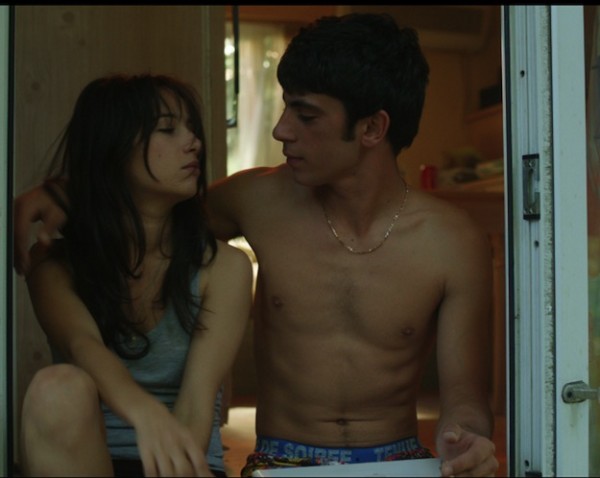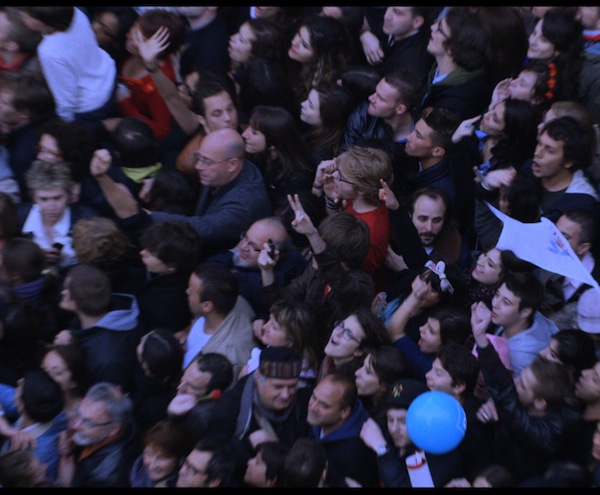Film Review: Selections from the 19th Annual Boston French Film Festival — “Apaches” and “Age of Panic”
Two significant feature debuts at the MFA’s French Film Festival — Age of Panic goes where few movies have gone before, while Apaches trains a calm, dispassionate gaze on disaffected youth.
By Betsy Sherman
The Boston French Film Festival at the Museum of Fine Arts wraps up this weekend with five movies, among them two notable feature debuts, Thierry de Peretti’s Apaches (Les apaches, showing July 26 at 6:15 p.m. and July 27 at 1:30 p.m.) and Justine Triet’s Age of Panic (La bataille de Solférino, showing July 26 at 8:15 p.m. and July 27 at 3:30 p.m.)
The actor and theater director Thierry de Peretti worked with a young cast of mostly non-professionals for Apaches. The title reaches back about a hundred years to a term for the gangs of juvenile delinquents that seemed to be turning the streets of Paris into the American Wild West.
Apaches is set in Porto-Vecchio on the island of Corsica, where many residents of mainland France keep vacation homes. These houses are tended to by the locals in the off-season. On the grounds of one particular house, a Muslim man interrupts his landscaping duties in order to pray. Meanwhile his son Aziz, who’s about 18, cleans the pool. At night Aziz returns to “host” a pool party for his friends. He knows where the key is hidden, so the kids have the run of the uninhabited house. The next morning, they’re back at their day jobs. For the boys, it’s grueling and unsatisfying work at a construction site. A young woman works at a hotel; she’s the only one among them who appears to have a spark of ambition, and a chance at a brighter future.
Not long afterward, the owners of the house arrive. Things have been stolen. A local fixer assures them there’s no need to involve the police. The haul, consisting of things like DVDs and household electronics, is returned. But something else—an intricately engraved rifle—is still missing.
It’s an old but enduring circumstance, that of townies who grow up envious of the rich tourists who breeze in and out of the resort. In this story, the Internet is also a little bit to blame. The kid who took the rifle easily finds out online just how valuable it is. This makes him stubbornly refuse to sell it for less. It becomes clear that if the gun isn’t going to be sold, it’s going to be used. The trajectory towards violence is fueled in part by ethnic divisions between those from long-time Corsican families and the more recent North African immigrants.
What I liked most about Apaches is its calm, dispassionate gaze. De Peretti doesn’t try to rachet up tension with jittery movement or frenetic cutting. There’s a particularly deft touch as events push towards a tragic end. Three of the young men drive away from the city and into the dusty countryside, and the audience shares their point of view, looking through the front windshield. Then the view shifts and we’re looking out the back windshield. Suddenly it’s no longer about distance but about time, about how it’s too late, about how things that have been done can’t be undone.
On the other hand, jitteriness is completely appropriate in Age of Panic, the back-handedly funny first feature by Justine Triet. The nightmare suffered by its Parisian protagonists over the course of one day is entirely of their own making. The feature shares the sensibility of the improv comedy-driven movies and TV shows that have become ubiquitous in the US and UK, although in interviews Triet has stressed that the dialogue was not ad-libbed but scripted and rehearsed.
A signal that the experience will be, um, challenging, is set by the non-stop bawling of a toddler in the extended opening scene. The girl and her sister are being watched by the bemused boyfriend of their mother, Laetitia (Laetitia Dosch). The oblivious mother is trying on a series of outfits and whining that she’s late for work. The boyfriend goes off to his job and Laetitia leaves the girls in the care of a babysitter she’s meeting for the first time, Marc (Marc-Antoine Vaugeois). Among the instructions she gives him: if the girls’ father tries to enter the apartment, alert the downstairs neighbor, because the neighbor knows karate. Uh-oh.
Laetitia rushes off to work. It’s May 6, 2012, and she’s a TV reporter covering the announcement of the winner of the presidential election run-off. The result will be that François Hollande beats Nicolas Sarkozy to put the Socialist Party back in power.
Here is where Age of Panic goes where few movies have gone before: the crowd scenes are real, and as far as the people in the street were concerned, actress Dosch was just another journalist shoving a microphone in their face for a candid comment. Triet and crew, not knowing which side would win, shot the events of May 6th documentary-style outside of both party headquarters. Triet then devised the domestic drama that would be integrated with this footage.
But if Age of Panic is comparable to Medium Cool — the movie that incorporated footage of the riots outside the 1968 Democratic convention in Chicago with a fictional story — it’s in the inverse. Despite the multitudes in the streets of Paris, the political upset didn’t cause much strife (we see riot police milling around with nothing to do). In contrast, the fight over child custody by these estranged parents, and the shrapnel that hits others unlucky enough to take sides, is incendiary.
So who is this baby-daddy that needs to be repelled with martial arts? While Laetitia changes outfits, her ex Vincent visits shops with a vague idea of what might be appropriate to buy for baby girls. This weekend is a court-approved time during which he can see his kids. Actor Vincent Macaigne, long-haired and balding, bears a resemblance to Nicolas Cage—at this point, he’s the goofy, hangdog-charming Cage. He shows up at the apartment, causing Marc to call Laetitia, who makes the very bad decision to tell Marc to bring the girls to the teeming street corner on which she’s stationed. The frustrated Vincent follows, and there are hints he could turn into loose-cannon Nic Cage.
The final passage of the film takes place after the election hoopla. Vincent ropes in a law-student friend (Virgil Vernier) and goes to Laetitia’s to have it out about his right to be in his daughters’ lives. Vincent is erratic, argumentative, and intense, but at least he seems genuine. Laetitia goes into battle mode and lashes out verbally and physically at Vincent. One of the movie’s funniest moments was when she slapped a mask of cheeriness over her previously sour face once she stepped in front of a camera. Is she wearing another mask during the argument? Triet brings something of a documentary approach to this part of the movie too, in that we’re not given any backstory about the couple’s relationship. We don’t know whether Laetitia is overreacting by trying to keep the kids from Vincent, or if she’s motivated by something from the past we don’t know about. Even though the extended spat gets difficult to sit through, it’s an interesting storytelling exercise. Leads Dosch and Macaigne are fine as the self-obsessed parents, as are Vaugeois and Vernier as the distressed bystanders who are as ill-informed as we are about this couple’s dangerous dynamic.
Betsy Sherman has written about movies, old and new, for The Boston Globe, The Boston Phoenix, and The Improper Bostonian, among others. She holds a degree in Archives Management from Simmons Graduate School of Library and Information Science. When she grows up, she wants to be Barbara Stanwyck.
Tagged: Age of Panic, Apaches, Justine Triet, MFA French Film Festival, Museum of Fine Arts


